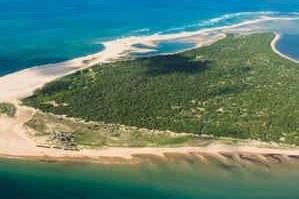
Top stories


ESG & Sustainability#BudgetSpeech2026: SRD grant unchanged, other Sassa social grants see hike
7 hours




More news











ESG & Sustainability
South Africa’s carbon tax should stay: climate scientists explain why











Working closely with the Mozambique government, tourism, the Inhaca Administration, universities, biology stations, and environmental experts, MSC Cruises carefully considers its guests, the local community, as well as the environment with every development spearheaded in the archipelago.
With every visit, an average of 2,300 passengers disembark onto the pristine Portuguese island to delight in the upgraded beach bars, dining decks complete with cooler spray systems and shade sails, private VIP areas, fun zone, the water sport centre, and an exclusive beach club.
This development has been accomplished with all structures as non-permanent. Everything has been built from timber in line with green building practices. Every palm tree planted is indigenous. The sewerage system is bio-degradable. Even wooden walkways have been added so that excessive foot traffic won’t damage the island’s delicate sand dune ecosystem.
MSC Cruises has also constructed a sophisticated desalination plant which converts sea water into potable water, and has installed a fully integrated solar-powered electrical system to power the development.
Most recently, MSC Cruises has stepped in to assist the Inhaca Island inhabitants with their growing concerns over the Indian house crow invasion. The Indian house crow (Corvus splendens) was introduced to Africa in the 1890s, and is an invasive alien bird species that is currently targeted for eradication in Southern Africa, most notably in Cape Town and Durban.
The Indian house crow’s aggression in outcompeting for food and space and its habit of preying on other birds’ eggs and chicks has a negative impact on indigenous bird populations. It’s also a highly opportunistic feeder that threatens other local wildlife by preying heavily on frogs, lizards, small mammals, fish, crabs, and insects. A further concern regarding the Indian house crow is that it carries passively transmitted pathogens which cause cholera, typhoid, dysentery, and salmonella poisoning.
In September 2015 MSC Cruises started its collaboration with A Estação de Biologia Marítima de Inhaca, The Administracao Municipal KaNyaka, and The National Museum of Natural History in an integrated eradication programme of the Indian house crow. With the assistance of South Africa’s Department of Environmental Affairs, MSC Cruises is coordinating and funding a multidisciplinary approach that adheres to best practice and humane methods.
But it’s not just the local environment that MSC Cruises continues to invest in in - it’s the local economy as well. Most recently, when the local fishery closed down, leaving Inhaca Island’s villagers without their main source of income, MSC Cruises stepped in, leased the fishery, upgraded the facilities and freezers, and now purchases the daily catches directly from the fishers - averaging at approximately 250kg of fish per call, and providing much needed income for the local community.